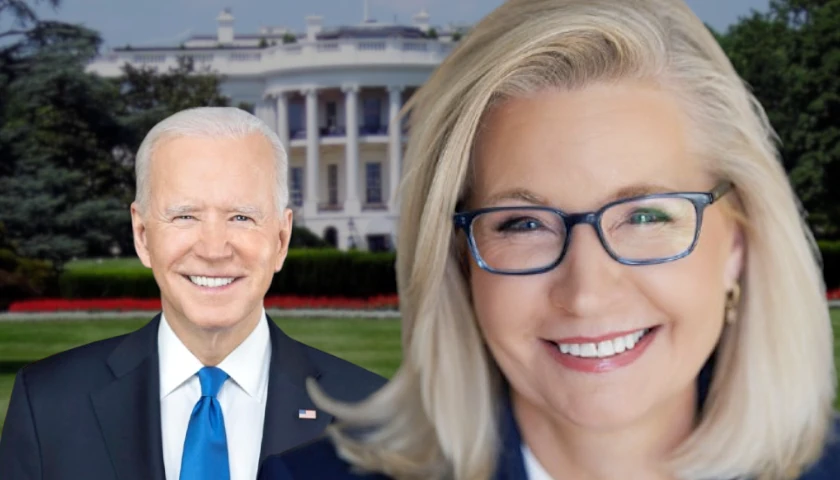by Robert Schmad
AARP, an organization that represents the interests of retired Americans, spent tens of millions of dollars promoting provisions in the Inflation Reduction Act (IRA) that likely benefit the bottom line of one of the group’s major corporate backers.
AARP spent more than $60 million between 2019 and summer 2022 advocating for a provision that eventually made it into the IRA allowing Medicare to negotiate with pharmaceutical companies over the prices of certain drugs, according to an article posted on the group’s website. The provisions would require the Department of Health and Human Services (HHS) to negotiate the prices of certain drugs with drug manufacturers starting in 2026.
“We agreed that state directors would drop everything and get on this. Calls started going in to the White House and congressional leaders by 10 a.m. We had never responded to something so quickly,” Nancy LeaMond, AARP executive vice president and chief advocacy and engagement officer, said in the article. “Over the next few days more than 400,000 communications from AARP members and activists made it clear to leaders in Washington that taking Medicare prescription drug reform out of the budget package was unacceptable. Members emailed, called, tweeted and posted on Facebook and other social media channels.”
 However, experts say that AARP’s article leaves out how the Medicare negotiation requirements would benefit private insurers such as healthcare conglomerate UnitedHealth Group, a major source of AARP’s funding. Additionally, the IRA expands subsidies under the Affordable Care Act to private insurance providers, offering another boon to insurers like UnitedHealth.
However, experts say that AARP’s article leaves out how the Medicare negotiation requirements would benefit private insurers such as healthcare conglomerate UnitedHealth Group, a major source of AARP’s funding. Additionally, the IRA expands subsidies under the Affordable Care Act to private insurance providers, offering another boon to insurers like UnitedHealth.
“Under the IRA insurers like UnitedHealth are in line for a financial windfall with super-sized subsidies for Obamacare policies and government price controls dictating pricing of many medicines,” wrote Phil Kerpen, the president of the free-market policy advocacy group American Commitment, a 501(c)(4) non-profit organization.
AARP receives a significant portion of its funding through royalty agreements with insurance companies, who use AARP’s brand to market their products. These agreements have historically provided a greater share of AARP’s revenue than dues paid by retirees, a DCNF review of the organization’s financial documents found.
UnitedHealth pays AARP royalties to use the group’s brand to market insurance plans. AARP also collects a 4.95% share of monthly payments made to UnitedHealth for insurance on co-branded AARP-UnitedHealth Medigap plans, KFF Health News reported.
AARP received $909 million in corporate royalties in 2017, with 69% of that revenue, or about $627.2 million, coming from UnitedHealth alone. However, that was the last year AARP reported the proportion of its royalties that came from UnitedHealth, making these the most recently available official numbers.
American Commitment estimates that UnitedHealth funded AARP by $732 million in 2022.
“The royalty revenue generated is used by AARP in support of our mission to protect Social Security and Medicare, lower prescription drug costs, enable people to save for retirement and support family caregivers,” AARP Senior External Relations Director Colby Nelson said in a statement to the DCNF.
Kerpen told the DCNF that the IRA would directly improve UnitedHealth’s finances by reducing the amount they need to pay to acquire drugs and by extending the subsidies paid to UnitedHealth under the Affordable Care Act (ACA). The ACA, which has been commonly referred to as “Obamacare,” was signed into law by former President Obama in 2010.
UnitedHealth is the largest health insurance provider in the United States when measured by market share. The firm has increasingly been moving into the businesses of providing healthcare, spending billions acquiring medical practices and pharmacy benefit managers.
Under the IRA, HHS is obligated to negotiate the prices of certain drugs covered under Medicare Part D with drug manufacturers. Medicare Part D is a program individuals on Medicare can opt into through private insurers that covers most outpatient prescription drugs.
Brand name drugs covered under Medicare Part D are eligible for negotiation under the IRA if they lack generic equivalents or readily available alternative treatments. Pharmaceutical companies that refuse to accept government-imposed drug price ceilings face a steep excise tax.
Chris Jacobs, founder of the health policy research firm Juniper Research Group, told the DCNF that the drug price negotiation provisions in the IRA “would reduce prescription drug costs for United” in a way “that ultimately will benefit the insurance company’s bottom line.”
Jacobs also pointed out that the Obamacare subsidies extended by the IRA “are payable directly to insurance companies” like UnitedHealth.
By subsidizing insurance plans, Jacob argues, the government increased insurance enrollment and incentivized people to purchase more expensive plans, thus generating more revenue for insurance providers.
Michael Cannon, director of health policy studies at the Cato Institute, told the DCNF that “the insurance companies figure the amount they might be paying for these drugs [under the IRA] would go down.” If insurance companies pay less for drugs, they could expand their profit margins.
Grace-Marie Turner, president of the Galen Institute, a non-profit, Section 501(c)(3) healthcare policy research organization , told the DCNF that insurance companies are “just looking at their own bottom line, and they’re saying ‘Oh good, if Medicare can pay company ‘X’ a dollar for their pill, we’ll be able to do that too.’”
“Medicare is often the payment standard upon which the private health insurance industry bases their own payments,” Turner explained.
AARP championed the IRA, which experts told the DCNF would benefit its corporate health insurance backers.
The organization expressed gratitude to President Biden for signing the IRA into law in a press release. Jo Ann Jenkins, president and CEO of AARP, called the IRA, which passed without any Republican support in Congress, “a monumental victory.”
In addition to the $60 million it spent between 2019 and 2022 on ads pushing for government drug price negotiations, AARP lobbied Congress to influence the IRA, according to lobbying disclosures.
AARP also “generated 3.6 million emails to lawmakers and flooded congressional offices with hundreds of thousands of phone calls” to push for drug price negotiations, according to its website.
“It is plain common sense that Medicare should negotiate for lower prices,” AARP Senior Vice President of Government Affairs Bill Sweeney told the DCNF.
“For too long, big drug companies got a sweetheart deal that, unbelievably, forced Americans to pay the highest prices in the world,” Sweeny said. “AARP fought hard to end that horrible deal, saving our country and taxpayers hundreds of billions of dollars.”
AARP did not address the DCNF’s questions about the possible conflict of interest posed by their insurance royalties.
‘Betrayed Seniors’
Some healthcare experts disagree with AARP’s characterization of the IRA, arguing that the drug negotiation provisions could end up harming seniors by discouraging pharmaceutical innovation and production of new drugs.
“AARP betrayed seniors by supporting a regime of price-fixing that will result in fewer new drugs, and therefore reduce the chance of a major breakthrough in Alzheimer’s, cancer, and other leading causes of death,” Kerpen told the DCNF.
Government-imposed price ceilings would make it more difficult for manufacturers to recoup research investments since they would have to sell drugs at lower prices, experts told the DCNF.
“It’s not a negotiation, it is the government dictating to companies that they must charge a price that the government deems itself to be reasonable,” George Mason University law professor Adam Mossoff told the DCNF. “If you are negotiating a price over a house or something of that sort, the other side doesn’t get to impose massive crippling penalties on you … if you decide not to proceed with the negotiations.”
The IRA’s price negotiation system could also have consequences for the supply of existing drugs used by seniors, Mossoff said.
Mossoff argued that the reduced pharmaceutical manufacturer revenue brought on by the IRA’s price negotiation system could impact the supply of existing drugs used by seniors.
“Manufacturers, when they’re not making enough money to even recoup their own expenditures, as a matter of economic necessity make less,” he continued. “Not because they want to, but because they’re being compelled by law to do so.”
A University of Chicago policy brief estimated that the IRA would result in a 12.3% reduction in pharmaceutical research and development. Likewise, the Congressional Budget Office estimated eight fewer new drugs over the next thirty years as a result of the IRA, and University of Chicago scholars estimated 79 fewer new drugs over the next 20 years.
A report produced by the health consultancy firm Vital Transformation, which was cited by the House Budget Committee, estimated there would be up to 139 fewer new therapies over the next ten years as a result of the legislation.
“One of the reasons why senior citizens are living longer in retirement is the fact that the United States is the leader in biomedical research and breakthroughs in new therapies,” Moffitt said. “When we are going to have fewer approvals for new medicines for patients battling neurological diseases or cancer or certain types of infectious disease, that is going to affect people on Medicare.”
The Congressional Budget Office estimated eight fewer new drugs over the next thirty years as a result of the IRA, while a policy brief produced by scholars at the University of Chicago estimated 79 fewer new drugs over the next 20 years. A report produced by the health consultancy firm Vital Transformation and cited by the House Budget Committee estimated there would be up to 139 fewer new therapies over the next ten years as a result of the legislation.
A 2022 survey from the Pharmaceutical Research and Manufacturers of America, a drug manufacturer trade association, found that 78% of its members were expecting to cancel some of their drug development projects. The survey also found 95% of PhRMA members expected to develop fewer new uses for medicines following the passage of the IRA.
“One of the reasons why senior citizens are living longer in retirement is the fact that the United States is the leader in biomedical research and breakthroughs in new therapies,” the Heritage Foundation’s Bob Moffit told the DCNF. “When we are going to have fewer approvals for new medicines for patients battling neurological diseases or cancer or certain types of infectious disease, that is going to affect people on Medicare.”
The Cato Institute’s Michael Cannon argued the IRA represented an improvement over the status quo and would likely lead to lower drug prices for seniors. He pointed out that, prior to the IRA, Congress would determine what Medicare paid for drugs, arguing the new negotiation system, with its enforcement mechanisms, would likely yield lower prices for seniors.
Cannon was still critical of the IRA, however, saying that “the best thing we can do is to get the government out of the business of buying drugs.”
While drugs covered under Medicare Part D would become cheaper, Cannon said treatments not covered under the program may become more expensive as a consequence of the IRA and that research and development funding for new drugs could dry up.
UnitedHealth did not respond to the DNCF’s request for comment.
– – –
Robert Schmad is a reporter at Daily Caller News Foundation.








